Bartle went to his kitchen, which was only a sink, a refrigerator and a small gas stove tucked into the north corner of the big room. Under the window was a table with a handful of weeds in a Mason jar. He looked into a cupboard and rooted around in a bin. “I have parsnips and potatoes. Bacon. Two tomatoes. Bread. What do you think?”
Louvina nodded and got busy. She cut the tomatoes into a Pyrex pie plate and sprinkled vinegar, sugar and salt on them. Bartle clanked around, muttering, looking for his cast iron skillet, which he finally remembered was in the oven. He peeled the vegetables. She sliced some bread and laid the table with old green dishes she found on the bottom shelf.
“I sure do like this plaid oil-cloth you lined your shelves with, Bartle. I am thinking you'd make somebody a fine wife,” she said, hoping to get a rise out of him.
Bartle flashed her a smile but made no reply. He fried up the bacon in the skillet and tossed in the vegetables.
“My Irish grandmother called this “tatties and neeps,” he said. Louvina told him her Scottish grandmother did the same. At the first smell of bacon, Maggie woke up, stretched and casually sat down beside Bartle at the stove, looking up at him. Bartle handed him a piece of that bacon and made a friend for all eternity.
Louvina turned to face him, leaning against the table. “How I love to watch a man cook,” she said. “It does my heart good.”
“Well, a man has to learn to feed himself, doesn’t he? Let me remind you, Louvina, that the most famous cooks in the world are men. And when it comes time to judge my expertise in the kitchen, please keep in mind the humble ingredients I have to work with here. You cannot expect exotic cookery when you are working with a parsnip.”
“Bartle, I'd never judge anyone who offered to feed me,” Louvina assured him. “That would be not only impolitic, but downright rude.”
He went to the refrigerator and found a metal basin of leftover stew which he put on the floor for Maggie. The dog gulped it down noisily and then did his own washing up, licking every smear of grease out of the pan, banging it along the floor all the way across the room. He came back to Bartle's side and leaned on him.
As Bartle cooked, Louvina browsed through his small stack of record albums. “I see your taste in music is quite varied,” she commented. “Jimmy Rogers, The Singing Brakeman. Antonio Vivaldi, Concerto for Two Oboes. Tommy Dorsey, Nobody's Baby. Paul Robeson, Songs of Free Men? It appears that you are building a rare one-of-each-kind collection,” she said.
“Well, every day is different, isn't it? I have long believed that a mind that is exposed to a wide range of experience is the well-spring of a vigorous and creative life,” he said, quoting somebody. “Put on whatever music you like, Louvina. I’ll like whatever you choose.”
They sat down to a simple meal, Brahms playing in the background. Bartle handed a few bites of parsnip to Maggie under the table. The dog accepted them from his hand with canine delicacy. Supper was quiet, their conversation easy. They looked to be of the same tribe, those three - the epitome of comfort and affinity.
After supper they washed up the dishes and Bartle made a pot of coffee. Louvina added more wood to the hearth grate, which popped and snapped, sending a small explosion of sparks up the chimney. She moved a basket of pinecones, and poked at the log to settle it in. They sat together, Louvina in the rocker, Bartle on the chair. The room smelled comfortably of evergreen, damp wool, smoke and bacon.
She picked up a volume of Robert Frost from a pile of lightly dusty books stacked on top of the book case. She turned to the bookmarked page. “Is this what you have been reading, Bartle?”
“I read through that last week, but changed my mind and switched to Coleridge,” he said. “I was too restless for Robert Frost. I needed something more challenging, I guess.”
Louvina read aloud,
“When a friend calls to me from the road
And slows his horse to a meaning walk,
I don't stand still and look around
On all the hills I haven't hoed,
And shout from where I am, “What is it?”
No, not as there is a time to talk.
I thrust my hoe into the mellow ground,
Blade-end up and five feet tall,
And plod: I go up to the stone wall
For a friendly visit.”
“Robert Frost being neighborly,” she said. “Taking time out from his labor to talk to someone of like mind. I have missed friends just dropping by since I came to California. My house isn't a quarter-mile from my neighbors, really, yet sometimes it seems so remote. In Iowa, where I lived before, people walked by all the time, stopping at the fence to visit, coming in for coffee. No one waited for an invitation, we were just sociable. Now I rarely see anyone from one day to the next, other than the mailman.”
“Well then, I guess it was a good thing that I came by,” Bartle said, smiling
“Not a moment too soon,” she agreed.
Maggie was standing and staring at the front door. Bartle rose to let him out. “I never could figure out exactly what Frost meant by ‘he slows his horse to a meaning walk’. What the devil is a ‘meaning walk’?”
“You got me,” she said, shaking her head. “I like poetry, some of it. There is a good deal in it I don't understand, but I don't mind not understanding everything. God knows there's a good deal of life in general that I can't figure out either. Life is a mystery to me most of the time.” She smiled at him.
“I am not sure I know what you mean. Like what, for example?”
Louvina thought for a bit. “Well, you know ... I used to think that having peace in my life would be to live in a place where there was no noise or trouble or meanness. But now I think it might be different. It might be that the true measure of peace does not depend on your surroundings. Maybe it is when you can live in the midst of clamor, hardship and toil, and be able to calm your heart, still your mind, maybe that is the real meaning of peace. What do you think?” She went to bring the coffee pot in to Bartle.
“Maybe,” he said. “But are you happy, Louvina, living there in that house and in these hills alone?” he asked, handing her his cup, studying her face.
“Well, that is a question. Now that my brother is gone I admit I do lose myself sometimes. I am not at all sure what I am meant to do now.” She paused to gather her thoughts. “What I mean is, I work in the garden, I take in ironing for folks, I keep up the house, I read, I go for walks. I generally feel safe and content, but it troubles me that I haven't found how to be useful now. I walk about feeling invisible sometimes. I don't know, maybe that makes no sense.”
“Oh, it makes sense,” he said, giving her a long look, which she returned.
“Now, you, Bartle, you seem to be a contented man, for one who has no family, and who does everything for himself.” A log fell in the hearth and she grabbed the poker and went over to move it safely back.
“I am as content as I deserve to be,” he replied, and went to let Maggie back in. The hound walked over to look into the stew bowl. Finding it still empty, he lay down beside Bartle, resting his chin on the man's stockinged foot. “I do have a measure of humility in me now, that I did not have as a boy growing up in Wyoming. I am like the man Coleridge speaks of: ‘The humble man, who, in his youthful years knew just so much of folly, as had made his manhood more securely wise.’ ”
“Oh, well, all young men do foolish things, that’s for sure, and you no doubt as much as any, but not all grow out of their foolishness. I have known a few men who never approached even a hint of maturity or wisdom,” she said.
“No, now don't mistake me. I don't think of myself as wise — far from it. But I am a resourceful man, Louvina, and I know how to work and how to rest and how to entertain myself. I’ve had the benefits of solitude and independence for fourteen years in these hills. Sometimes now I am a little restless, though. I weary of my own company. I just … I crave a thoughtful conversation now and again.”
“Well, if it is of any comfort to you, Bartle,” she said, lightly mocking, “I believe you may have acquired yourself a dog for company now. It looks like maybe Maggie has decided to stay with you.”
Bartle laughed aloud for the second time that day, patting the top of Maggie's head. “Well, he is most welcome. His conversation will, of course, be sorely limited, but his affection is undeniable.”
Bartle rose, returned the coffee pot to the sink and turned off the record player. “I don't know about you, Louvina, but I am tuckered out. It has been a good day and a full day. And, as for tomorrow … well, we'll have to see how that comes about when we get to it.”
“Sufficient unto the day is the evil thereof,” agreed Louvina, quoting a remembered verse of Matthew. He nodded in recognition of it.
“Is there anything else you need tonight?” he asked, handing her an extra blanket from his cupboard. “It can get darned cold in here.” She shook her head. He thanked her for her good company and went back to the blue door. “You'll have your privacy, but I'll be right here, if you need anything.” He pulled more blankets and a pillow from the cupboard. “Now don't leave until I get up in the morning to see you off.”
“I am an early riser, Bartle, but I'll not run off without a cup of coffee,” she promised. She wished him a good sleep. Maggie slipped into the back room with him and Bartle closed the door.
Louvina washed up in the tiny bathroom and then went to the door to look out at the night sky. She found it now clear and full of stars. A gibbous moon sat on top of a distant oak like a big slice of lemon. She stood in the doorway a minute, taking a few deep breaths of the cold, clean air and then lay down on the cot in her clothing. The curtain above the cot stirred lightly, as a breath of the October night came in through the sill. The waning fire cast shadows on the opposite wall, like an old-time Magic Lantern. The house was absolutely still. Pulling a dark grey wool blanket up to her chin, she said a short prayer and fell right into a dreamless sleep.
Bartle on the other hand, did not find sleep so easy to come by. The back room was cold, though he did turn on a small electric heater to get some of the chill off one corner of the large studio. He made up a pallet on the patch of floor between his easel and the work table. Maggie stretched out at his back, which Bartle welcomed, if only for the heat. As he lay on the floor, somewhere between a foggy vigilance and oblivion, he felt unsettled. Louvina was just fifteen feet away. And she was in his bed.




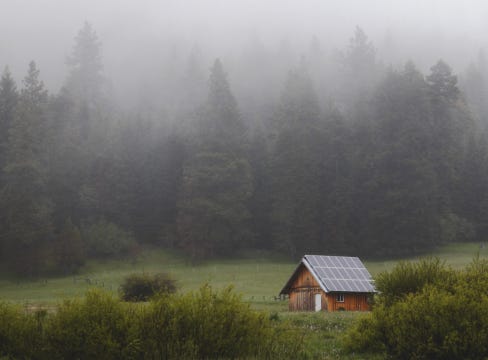
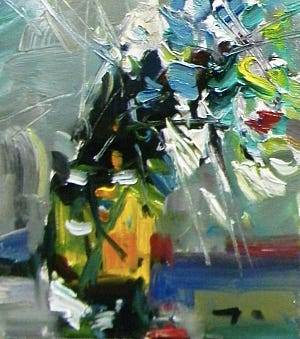
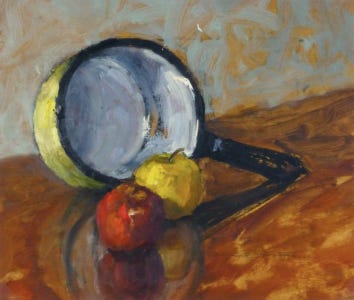
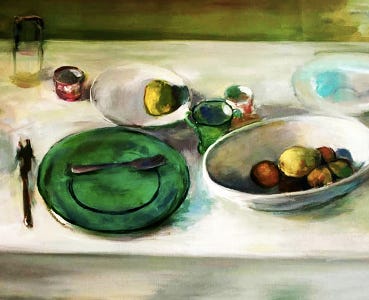

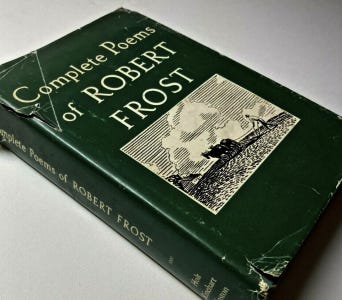

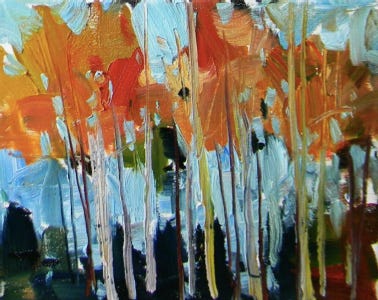
You have really brought these characters to life. Well done, Sharron.
I really like this story. The pics and photos work great with the prose! Most excellent!